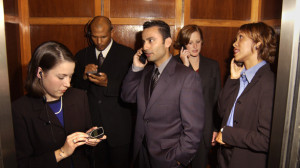In order to stave off misunderstanding, before I get to my main point today, let me assure any and all readers that I really do like new technology. I mean, I’m using a computer right now, and there are still some who haven’t crossed that barrier. I’m not one of them.
 How I wish I’d had a laptop back in 1981 when I was completing my master’s thesis. Try typing a 138-page paper in time for graduation, knowing that if you make a mistake along the way, it might require retyping multiple pages. In fact, when I turned in my thesis, a fact-checker found technical errors that had to be corrected within 48 hours or I wouldn’t be able to graduate. The errors required a complete redo of the thesis, which, in pre-computer days, meant I had to hire two typists to do the job quickly.
How I wish I’d had a laptop back in 1981 when I was completing my master’s thesis. Try typing a 138-page paper in time for graduation, knowing that if you make a mistake along the way, it might require retyping multiple pages. In fact, when I turned in my thesis, a fact-checker found technical errors that had to be corrected within 48 hours or I wouldn’t be able to graduate. The errors required a complete redo of the thesis, which, in pre-computer days, meant I had to hire two typists to do the job quickly.
No, I’m not a Luddite (feel free to Google that, if necessary).
When I teach, I love using whatever technologies might be available to help get the message out. As a new professor, back in the late 1980s-early 1990s, I still didn’t have a personal computer. All my teaching was done via writing on white boards in the classroom. Later, I graduated to the overhead projector and thought I had stumbled across a slice of heaven. Then, when I finally was issued a laptop, in the late-1990s, I discovered the wonders of PowerPoint and my life has never been the same.
I don’t yet have a smart phone. Mine is just semi-smart; I get e-mail without attachments and I don’t want to pay for internet access. My main objection to moving into that realm is purely monetary, not some kind of fondness for former days when all phones could do was call someone. Skype has been a joy, allowing me to connect with family in other places, even halfway around the world.
So why did I go to this length to make it clear I’m not a technophobe?
 I’m concerned that, in the midst of all these marvelous advancements, we don’t lose either our humanity or our ability to pay attention to anything not techno-oriented. When I’m walking through campus, for instance, sometimes it seems as if all the students are in their own little world. Everyone is texting, talking on their cell, or lost in whatever realm they may be connected to with those wires leading to their ears.
I’m concerned that, in the midst of all these marvelous advancements, we don’t lose either our humanity or our ability to pay attention to anything not techno-oriented. When I’m walking through campus, for instance, sometimes it seems as if all the students are in their own little world. Everyone is texting, talking on their cell, or lost in whatever realm they may be connected to with those wires leading to their ears.
I know this is not just a student issue, but that’s where I live. A few years ago, I took the drastic step of forbidding the use of any technology—laptops, cell phones, whatever—in my lower-level survey courses, the ones that are part of the general education portion of our curriculum. You see, I already have a problem getting students interested in basic American history courses to begin with. Most take them because they are required to take at least one history course of some kind. They don’t really want to be there, so why not spend the time more profitably (in their view) on Facebook, Twitter, or any of the other social networking sites?
So I decided to challenge them to see if it’s even possible for this current generation to set aside their devotion to their devices for a 50-minute period and concentrate on American history. Just 50 minutes. Is that too much to ask? For many, apparently it is. I won’t go to the next level and confiscate phones as they enter the classroom, but I will admit to some discouragement. The discouragement is not primarily that I am being disrespected as a teacher; it’s more that they are so unwilling to spend that small amount of time doing something as traditional as listening and taking notes.
My deeper concern is that they won’t be able to communicate in anything but shorthand (u no wht i meen) and won’t develop their powers of thought beyond soundbites. A people that illiterate—and I use that word advisedly—are like sheep to slaughter as they unthinkingly contribute to cultural degeneration and political foolishness.
Just so you know, I don’t have a stringent policy of forbidding cellphones and laptops in my upper-level history courses. For the most part, the students in those courses want to be there, and they seek to add to their knowledge and understanding. But I’m finding those kinds of students to be increasingly rare, at least in my personal experience.
Am I simply a curmudgeon who likes to complain about anything new? I hope not. I also hope I might be wrong in my analysis of what I now perceive as a societal malady. I see the great potential of technology and wouldn’t want to return to typewritten theses. Yet I wonder. What are we losing as we continue on this path?
 A people absorbed in another world might not have time for other people who are staring them in the face. When I have meetings with individuals, whether a luncheon or just a conversation, I set aside my cellphone during that time. I won’t access it. I believe God wants me instead to devote my time to that other person, uninterrupted by the demands of texts, tweets, or Facebook messages. There is a time for that, but not when I’m supposed to be talking with someone personally, face-to-face.
A people absorbed in another world might not have time for other people who are staring them in the face. When I have meetings with individuals, whether a luncheon or just a conversation, I set aside my cellphone during that time. I won’t access it. I believe God wants me instead to devote my time to that other person, uninterrupted by the demands of texts, tweets, or Facebook messages. There is a time for that, but not when I’m supposed to be talking with someone personally, face-to-face.
Can we also be so absorbed by these media that we don’t have time for a face-to-face with the One who gave us the intellectual capacity to create the media in the first place?
All I’m saying is that we need to keep our priorities straight. We all need to examine ourselves regularly to ensure we aren’t crowding out of our lives those things that matter most.
